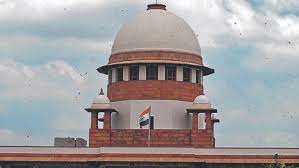Accordingly, the appellant was appointed as a Lecturer in English on a regular temporary basis with the 1st respondent college w.e.f. 16th June 2005. (Para 1)
Appellant was holding a tenure post of a limited duration (Para 1)
Allowed the petition and directed the 1st respondent to grant benefit of pay protection to the appellant and to pay the consequential arrears. (Para 2)
Submitted that the appointment of the appellant was not on a tenure post but it was on a regular post. The initial appointment of the appellant was on a tenure basis and as per the Guidelines for Academic Staff Colleges issued by the University Grants Commission, after assessment of the performance of the appellant, the tenure of the appellant was extendable up to the age of 62 years. (Para 3)
The only question for consideration is whether the appellant was holding a post in Academic Staff College on adhoc basis or was working against a leave/suspension or any other shortterm vacancy. For the reasons which we have set out hereafter, the said question will have to be answered in favour of the appellant. (Para 6)
What is important is that against the post held by the appellant, there is no remark that either it was a temporary post or a plan post. What is written in the bracket against the said post is “tenure basis”. Thus, the post was not ad hoc or temporary or plan post. The post was permanent on which appointment was to be made on tenure basis. (Para 7)
Therefore, the appointment of the appellant with the Academic Staff College of the 6th respondent was not against a shortterm vacancy. The appellant was not holding the post of Lecturer in Academic Staff College on adhoc basis and was not working against leave/suspension vacancy. Therefore, the exception carved out by the third proviso to Article 77D will not apply as the appointment of the appellant was on a substantive post on a tenure basis with a provision to continue the same till the age of 62 years. (Para 10)
The entire approach of the Division Bench was erroneous when it came to the conclusion that the appellant was not appointed on a substantive basis and, therefore, she does not satisfy the criteria laid down by Article 77D. The Division Bench has completely ignored that the only exception carved out to Article 77D was in respect of a government servant holding a post on adhoc basis or working against leave/suspension or any other shortterm vacancy. Hence, the case of the appellant was not covered by the said exception carved out to the third proviso by Article 77D. (Para 13)
Therefore, the impugned decision of the Division Bench cannot be sustained and the decision of the learned Single Judge which directs that pay protection should be given to the appellant, needs to be restored. (Para 14)
SUPREME COURT OF INDIA
2023 STPL(Web) 150 SC
[2023 INSC 690]
Asma Shaw Vs. Islamia College Of Science & Commerce Srinagar Kashmir & Ors.
Civil Appeal No. 4951 of 2023-Decided on 8-8-2023
https://stpllaw.in/wp-content/uploads/2023/08/2023-STPLWeb-150-SC.pdf







